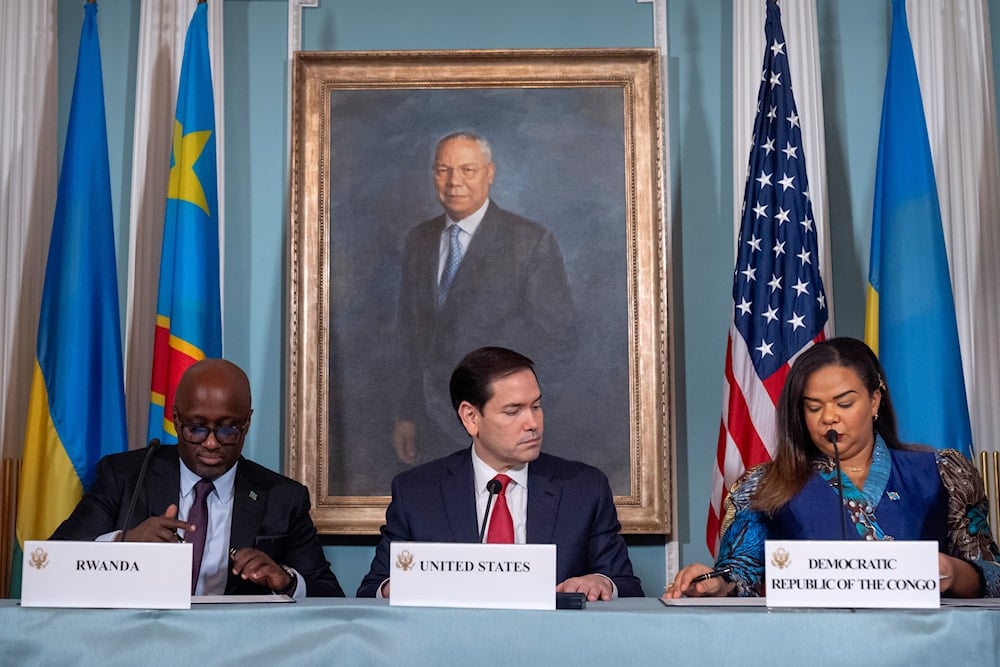DR Congo, Rwanda outline deal on mining, economic cooperation: US
The Democratic Republic of Congo and Rwanda have signed a US-backed economic cooperation framework focused on mineral transparency, marking progress in post-conflict peace efforts.
-

US Secretary of State Marco Rubio, center, watches as Rwanda's Foreign Minister Olivier Nduhungirehe, left, and Democratic Republic of the Congo's Foreign Minister Therese Kayikwamba Wagner, right, sign a peace agreement at the State Department, on June 27, 2025, in Washington. (AP Photo/Mark Schiefelbein).
The Democratic Republic of Congo (DRC) and Rwanda have reached a preliminary economic cooperation agreement as part of a broader initiative for de-escalation backed by the United States.
The "economic integration framework" was signed during talks in Washington, marking the first high-level engagement between the two countries since their June peace agreement.
According to the US State Department, the framework aims to strengthen regional ties and support post-conflict recovery by fostering cooperation in areas such as mining, energy, infrastructure, public health, and tourism. The agreement is expected to take effect by the end of September.
A central focus of the accord is introducing greater transparency into the supply chains for critical minerals, such as cobalt, coltan, and lithium, that are abundant in the mineral-rich eastern DRC. These resources are vital for global industries, particularly in the production of electric vehicles, smartphones, and laptops.
The United States, which oversaw the peace deal, has strategic interests in ensuring stable access to these minerals. In June, the DRC government signed an agreement with US firm Kobold Metals to support critical metals exploration. DRC President Felix Tshisekedi also met with US envoy Massad Boulos to discuss expanding cooperation on mineral access.
Broader areas of cooperation
Beyond mining and trade, the new agreement includes joint efforts in national park management, cross-border infrastructure development, and public health initiatives. While full details remain undisclosed, US officials emphasized that the framework lays the groundwork for lasting economic ties and deeper integration.
Representatives from the DRC and Rwanda were joined in Washington by observers from the United States, Qatar, and the African Union.
Eastern DRC has endured decades of instability, and violence resurged earlier this year when the M23 armed group, backed by Rwanda, captured strategic cities such as Goma and Bukavu. While Rwanda denies supporting M23, it accuses Kinshasa of harboring the Democratic Forces for the Liberation of Rwanda (FDLR), a group tied to the 1994 genocide.
On June 19, the DRC and M23 signed a declaration of principle reaffirming their commitment to a permanent ceasefire, two days after Kinshasa inked the minerals agreement with Kobold Metals.
Challenges Ahead and Peace Prospects
Despite the diplomatic momentum, analysts remain skeptical about the long-term prospects for peace. Militias continue to control large parts of eastern DRC, and deadlines for future peace talks, set between August 8 and August 17, are seen as overly ambitious.
Nevertheless, the US called the recent economic and peace coordination meetings "significant steps" and praised both countries for "taking meaningful actions to advance security and economic cooperation."
The African Union and United Nations have welcomed the peace process, though both organizations warn that sustained commitment and disarmament are essential to avoiding renewed conflict.

 3 Min Read
3 Min Read










